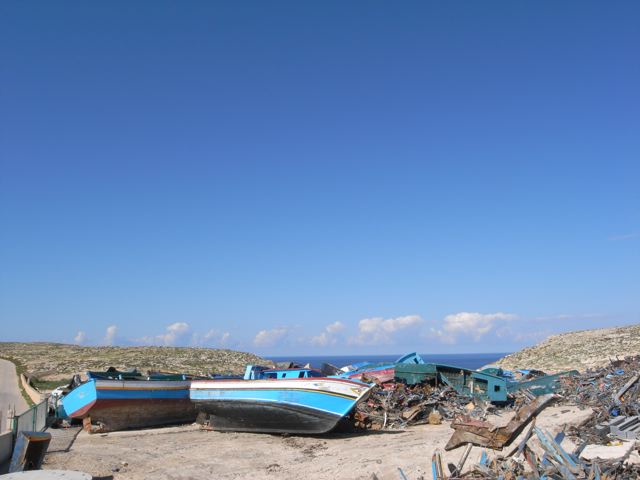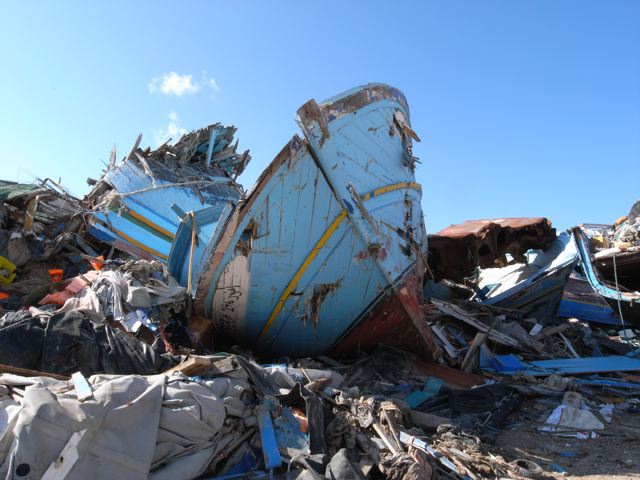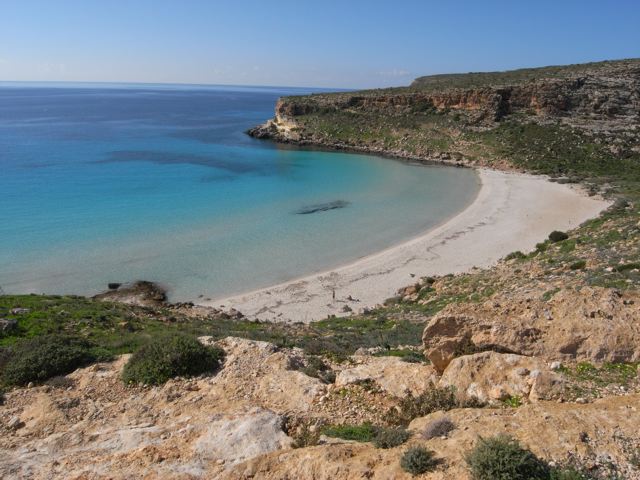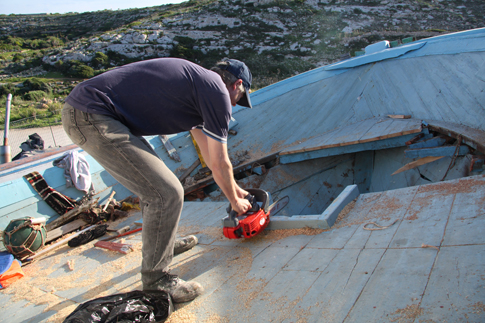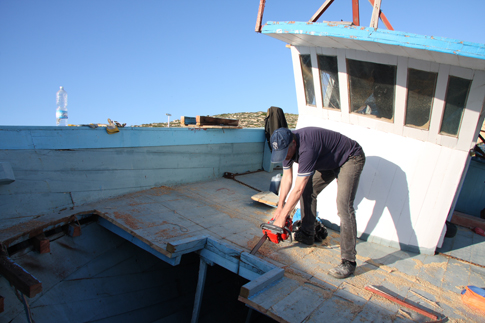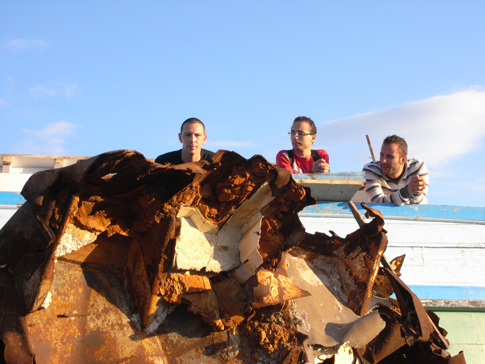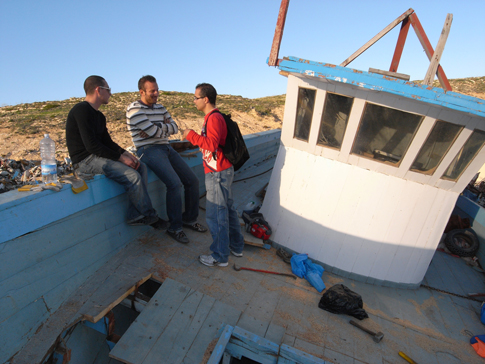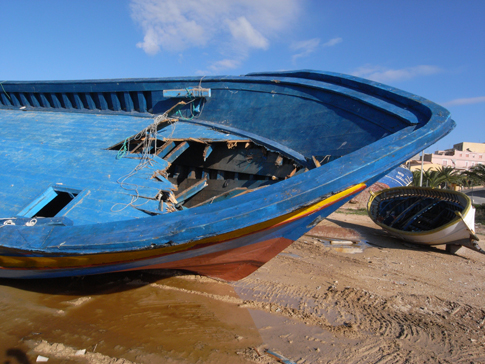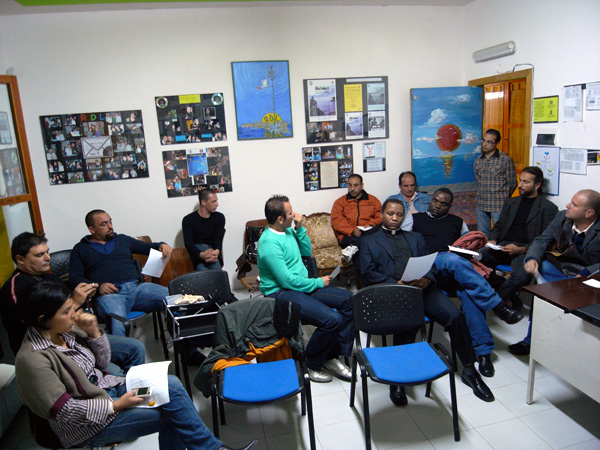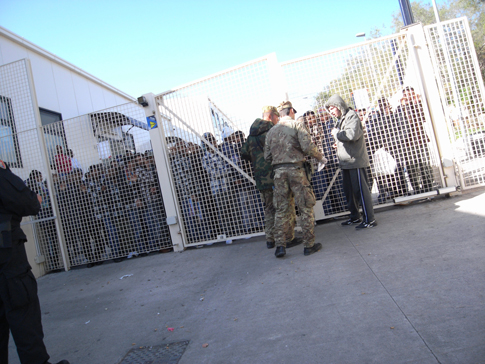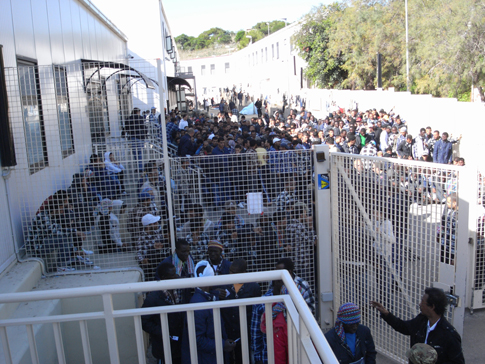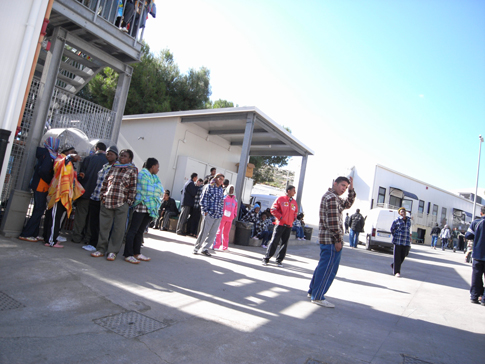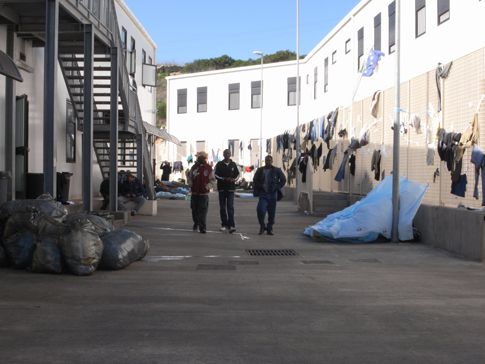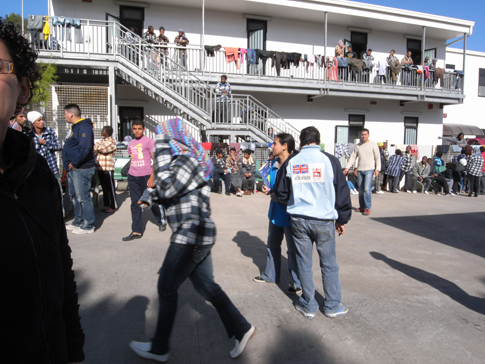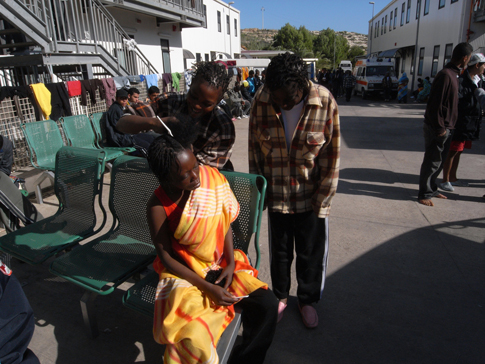Tuesday 18
At 4.30pm Andrea Sassi the director of dispari&dispari project and I leave Reggio Emilia and drive to the Airport of Parma.
We have booked Parma to Palermo. Queing up for the saftey check before boarding… the loudspeakers call “Mr. Andrea Sassi…please come to the luggage-control office…” oh oh, I think we get a problem… – in our luggage is one electrical and one petrol run chain-saw…. Andrea goes there while my hand-luggage get controlled more than intensively. My tripod does not go through; how naïve am I – of course it’s a potential weapon! Bringing it to my car is too late… so one policeman kindly organizes to get the closed check-in reopened and one more luggage-ticket.
Andrea arrives – he manages to make the police-officer say, “generously and exceptionally we do not halt your chain-saw”…
In Palermo superstress, even our plane arrives 10 minutes ahead schedule, we have only 5 minutes, as we booked two different flights and have to check-in (Palermo – Lampedusa) once more. We decide that Andrea goes directly to the check-in and only I wait for our luggage. When he arrives at the check-in desk, it was already closed! At the same time at the buggage belt when the first suitcases arrive I realize its really difficult to recognize someone else’s suitcase. They all look the same… but I was lucky to grab the right one – a quick look inside helped to make it clear.
Running upstairs as fast as I can… Andrea calls me, “Thomas where are you, hurry up!”… In the meantime he has gone to the office of the airline and manged that they reopened the check-in desk… They take our luggage and we run to the departure, passing the saftey control and boarding immediately. Puh, this was very tight.
Now a small propeller aircraft with about 30 passengers takes us. It flys quite nervously compared to the lethargic Airbus. At 10pm we arrive in Lampedusa. Maria’s sons pick us up at the airport and bring us to our appartment. The same house like during my first stay – but one more room was open and prepared for us. It’s different – this time I return, everything seems familiar and aquainted. After a pizza we go to bed – totally tired.
Wednesday, 19
After a quick breakfast-shopping and coffee, we go to the townhall. I say ‘hello’ to Marco, last time my interpretor – together we go to the major’s office, but he is not in. He is supposed to be here at 1 o’clock… So we get photocopies of the appeal and the invitation for our Friday evening meeting about the lighthouse project. From Berlin – some days ago – I had called Antonino from Radio Delta, since than he has organized this meeting. Really super! At Edo’s Noleggio we rent a scooter and a bike. ‘What are you doing here again?’… After a little chat and handing over the freshly copied appeal and invitation Edo’s wife Michela tells us, that she has a job in the refugee centre. She suggests to put us in touch with the anthropologist who works in the centre, too. Sounds very interesting. Andrea leaves his mobile number and we agree to stay in contact. We do a little tour with the scooter – to the boat cemetry, where some twelve new boats have been delivered since I was here, seven weeks ago.
Boat-Cemetry Lampedusa, 2008
Making contact with the depot’s staff members… some recognize me…Then we cross half the island down to the Istmo dei Conigli (Isle of Rabbits): Whow! What a stunning beach! White sand and the clearest and purest seawater I have ever seen.
Istmo dei Conigli (Isle of Rabbits), Lampedusa, October 2008
At 1pm we are back to the major’s office, but he is busy with another meeting. We are told to come back half an hour later, but we prefer to wait. Ten minutes later the major, Bernardino De Rubeis leaves the meeting and comes to us to sit down in front of us.
Andrea explains our request, that we already had expressed, that we need his authorisation in writing to split and take some of the refugee boats on a big truck to Reggio. Mr De Rubeis calls the director of the waste depot that we already have met in the morning. He doesn’t have any objections to our plan and instructs his assistant to set up a letter of authorisation. Half an hour later we have got it.
Off we go!
Preparations start, buying a petrol can, the petrol itself, gloves and we need extention lead for the electrical tools… Antonino – accompanied by his friend Nicholas – from Radio Delta and Alternativa Giovani comes to the waste depot. Great to see him again. He organizes the extention cables that we have to fix with each other – otherwise they loose connection: tape! We are badly organised, but the circumstances are difficult. What boat shall we take, shall we both work on the same, shall we do documentation, video, photos…? We choose one – that looks still relatively nice and is laying close to the entrance gate and office, where we get electricity. The sound of Andrea’s chainsaw is amazing. It immidiately suggests heavy labour is underway.
We do some ten – fifteen cuts – mostly in the direction against the boards, trying to avoid to hit the nails.
cutting the refugees’ boats
When we have to finish because of the darkness our results are meagre. Tomorrow we have to start early in the morning and do the cuts more systematically.
Andrea receives a phonecall of Michela who works in the refugee centre: tomorrow at 11am we can meet with the director of the CPT.
Thursday, 20
I wake up at 6.30 (for me very early), do a fruit breakfast, knocking up Andrea at 7.30. I join him to the bar for a quick coffee – at 9 everything is prepared and the chains are rattling. But today we have to cut in the other direction, where the chance to hit a nail is much bigger. Underneeth relatively soft floor planks are the beams that carry the weight and absorbe the power of the waves. They are the very core of the boats’ construction – and made from incredibly hard wood. And here I hit the nails. You cannot avoid as you can not see where they are. Promtley the chain is killed and smoke rather chippings arises. Definitely my day of disillusion. I get the feeling to fail. Shippwrecking with shipp-splitting?
Shortly before 11am we stop cutting – Andrea and I – briefly meet with Michela and Federico x, the director of the Lampedusa refugee centre – in front of the entrance gate. When he appears I first think: ‘this is not the centre’s director…‘ but obviously he is. thirty-something, long hairs, sportif, casual wear, bad teeth. I would like to address some questions… but he insists: “I can’t talk to you, as I don’t have any authorisation…”, “but why do we meet at all if you can not talk to me?”, my question fundamentally questions this meeting what everybody seems to understand; Federico changes his attitude: he now explains what we have to do: “write a fax with your personal details… to the Prefettura in Agrigento and ask for permission to visit the refuge centre and to do an interview with the directorate / me…” noting the fax-number on a piece of paper and leaving the scene quickly after.
Michela offers that we can send the fax from her husbands moto-rental workshop. So we drive to Edo’s ‘Noleggio’ – set up a letter first in English, Andrea translates it into Italian. An hours later the fax goes through – pigs must fly to get permission by tomorrow. But we have nothing to loose.
Andrea and I we go back to the ships and continue our work – but again the results are devastating and frustrating. Not easy to admit, but my time is too short, my means to little to get the plan carried out. I think I must give in and change the whole concept how to present the project in Reggio Emilia. To build an adequate model, walkable in its interior… in Andreas 300sqm space with nine meter ceiling… I’d need not just 15, 20 pieces (one sqm each) but at least some 100 or even 200 – otherwise its looking redicoulus.
Is it embarrassing – first to ask for permission and than to fail? And what about the company of the transport? We have to call them and cancel the job. Otherwise we have to pay! That means: we must decide now!
“we cannot succeed… the boats are densly nailed. These nails kill our chain saws…“, explaining the situation to Antonino and Nicholas who again came to the waste depot: they are quite disappointed and take it serious… what I like.
“It would be so great if you could build a tower from these boats… if you can’t do it now you must do it later in Lampedusa itself!” I agree and promise to try at a later stage – but for the time being – within our tight schedule – the boats are ‘stronger’ than we and our means.
That failure looks like a metaphor for the refugee problem as a whole: its bigger and more serious than expected. Dealing so directly and closely with the African boats I get a sense how much power is involved in the process of migration.
from authorities damaged refugee boat, Lampedusa harbor, 2008
For African fishermen the boats must be of big value. They are not designed for crossing the sea – but going out for fishing some miles offshore they seem well functioning and totally worthwhile.
Andrea calls the transport company but can’t get hold of anyone – he leaves a message “sorry, but we have to cancel our transport to Reggio Emilia…”, they don’t call back.
From now on we take photos from the boats and the boat cemetry as a whole – more systematically. If I can’t build the tower with the real boats I want to have the option at least to use photos of them in one way or the other. Building a tower with a large-sized collage of photos?… it’s totally open how my installation will be built and look like in 2 weeks time…
In the later afternoon Andrea and Antonino go for a swim – I prepare my slide-talk and the meeting tomorrow…
Friday, 21
At 10am I call the Prefettura in Agrigent. First attempt: the operator hangs up when he get aware that I ask for permission to visit the refuge camp in Lampedusa. Second attempt: he does not react nor put me through to the right officer until Andrea takes over the phone: “You will get the official decicion within ten days…”. “Sorry, but we’ll leave Lampedusa already after tomorrow, on Sunday”, Andrea explains very friendly. There is little hope to get permission; the reason seems because I am not a journalist.
In the afternoon we collect our belongings, tools etc… at the waste depot.
In the evening – at about 6pm – Andrea receives a phonecall from the prefettura in Agrigent! Friday evening, I never received any phone call from public authorities, but here in Sicilly they are still at work: they are about to release the permission for my visit in the refuge camp! What a surprise! And they need my date and town of birth… Wowh! Nobody expected anything like that: the next day I will be able to enter and visit the camp!
Interviewing the camps’ director, yes! – But…: no permission to talk to or even contact the migrants! That’s dull and very strange. Why that? … It’s said “to their own protection”? As if they could not express themselves if they don’t want to be interviewed. Somehow this shows their status: they are in custody and under state supervision, like a prisoner.
The meeting and my talk goes well. Twelve interested Lampedusians come; unfortunatelly only men – but the interpreter, she is an English-teacher. A film maker, two journalists, radio maker, students… even the pastor came with an African colleague. I show photos of previous projects and give a short introduction to my work – and as well to the lighthouse project. It is a very nice and constructive athmosphere.
Saturday, 22
Andrea drives the scooter and I – just sitting on my bike – holding his right arm, get pulled… what a nice way to move. shortly before 11am, we are waiting at the entrance gate of the refugee camp for the director and to get in… After a while it is clear: Andrea can’t enter, because we did not mention his name when we asked for permission on the fax to the prefettura… We try to convince the officers, “Can you not turn a blind eye on that, Andrea could be my interpretor…?” but they stick to their regulations. Only I can go in…
At first the police officers say: “no photo, no video…”, but the head-administrator of the camp, who is my supervisor intervenes: “panorama shots yes, portraits not”. He stays closely next to me, keen that I do not go beyond this “red-line”… but the longer we are in the camp, the more relaxed he gets.
Already at the entrance gate you can get a feeling that the camp is very full and crowded. It’s now shortly before lunch-time and the inmates are waiting outdoor in the courtyard and queuing for their meal.
Lampedusa Refugee Camp, November 2008
Francesca the camps interpretor (she speaks Arabic, French, English and Italian…) explains the structure of the camp. A so called “pre-identification” is the first thing in the camp the migrants have to undergo. Most of them arrive without official papers or ID, they are asked about their name, country of origine, date of birth and get an internal registry number. This procedure is followed by a health check with medical assistance and doctors from the camp. After that civil employees from the camp are handing out the so called “kit”. The “kit” comprises all clothes needed: a jacket, trousers, a shirt, underwear, socks, shoes… and a 5€ telephone card. So the migrants are able to call their families or friends for one or two minutes…
phoning @ Lampedusa Refugee Camp, November 2008
The Lampedusa camp is a closed off area. The migrants are not allowed to leave it. They are supposed to stay here for only a couple of days to make place for new arrivals. But in reality most of the inmates must hold out for a couple of weeks if not months because the other refugee- camps and CPTs in Sicilly and Italy are full, too or the Government not willing to take the Lampedusa-migrants. Therefore the Lampedusa camp often is heavily overcrowded. The same is now: in the men’s compartment the yard’s floor is widely covered with mattresses. They are without blankets – some inmates have tinkered a makeshift coverage as sort of a ‘roof’ from taped plastic bags, fixed from the camps metal fence to the bottom of their mattress. Coming from Africa to Europe = sleeping rough – even in November!
Lampedusa Refugee Camp, Makeshift Outdoor-Bed @ Men’s Compartment, 2008
We get asked for cigarettes or a lighter… they are welcoming Francesca; she is one of few from the camps administration they can talk and communicate in their language.
One migrant tells of his crossings experience, where three others have been perished drowning in the sea. Two in Africa when they had to swim to the boat – one when they arrived at the shores in Lampedusa… But that is the only short opportunity to talk to one of the refugees, when the inspector goes into the building to check the medical department (if we can go in or if there are patients who could be embarrassed about our visit). Francesca, the interpretor helps translating. I wished to be able to do more interviews with the immigrants. But no way…
In the medical department a couple of GPs and family doctors are engaged – but no specialists, even not a dentist. The administration seems to be proud of the modern kitchen with its conveyor belt and automatic production line.
When we are finished to walk and see the camp and the interview with Federico, the director is due, I learn that it can not take place! He is busy. Strange enough, that was the reason they suggested me to come here. Okay, lets try later in the afternoon.
Cycling back to our flat, I somehow feel stired up from what I have seen in the camp. They are living so cramped, why can they not leave the camp…?
In the afternoon we call Federico to do the interview but again, he is busy. “let’s do it tomorrow” he suggests. Is he willing to do it at all?
At 5pm we meet at Radio Delta’s office. The only local radio station on the island. It’s small but Lampedusians are listening to it. Antonino is doing a one hours live-programme on air with Andrea and me about the lighthouse project! Starting it off with Pink Floyds “WALL… we don’t need no education”, I have the opportunity to tell them how I developed the idea and how it might be realized in the future… We have good fun in the studio. Andrea translates into Italian what I say and he speaks from his perspective as a gallerist. Antonino is great, well organized, hard and fast engaged in social issues of the island, great fun to get to know him. He really wants to push the project on Lampedusa: “Why are you doing a modell for the lighthouse in Reggio Emilia… you should do it here, here is the place it has to stand…” he said on air.
Later we are going for a nice dinner together. Tomorrow we have to leave. In forteen days the exhibition opens at Andrea’s gallery!
